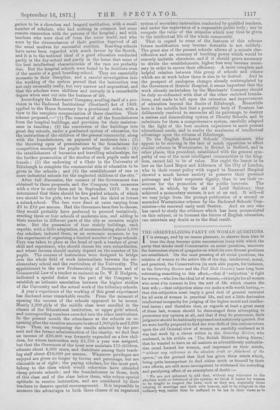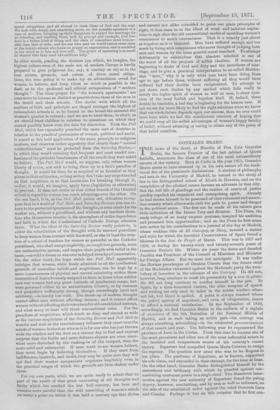THE ORIENTALIZING PARTY ON WOMAN QUESTIONS. T is strange, and
by no means pleasant, to observe from time to
time the deep because quite unconscious irony with which the party that thinks itself Conservative on social questions, uncovers the bottomless abyss of quagmire on which its own firmest positions are established. On the most pressing of all social questions, the
relation of women to the active life of the day, intellectual, moral, and practical, the Conservatives (in such able papers, for instance, as the Saturday Review and the Pall Mall Gazette) have long been reiterating something to this effect,—that if subjection' is right for wives,—who live the ideal lot of women,—it is right for all women. who must e'en consent to live the sort of life which creates the best wife ;—that subjection alone can make a wife worth having,— that this subjection must imply a good deal of general restraint for all sorts of women in practical life, and not a little derivative
intellectual incapacity for judging of the higher moral and intellec- tual issues ; and therefore that, as regards at least a great many of these last, women should be discouraged from attempting to pronounce any opinion at all, and that if they do prouounee, their judgment should be habitually repressed and sedulously ignored. But we were hardly prepared to find the true drift of this curious return
upon the old Oriental view of women so candidly confessed as it was last week by a clever writer in the Saturday Review, who confessed, in his article on "The British Matron taking Alarm,' that he wanted to have on all matters an adventitiously authorita- tive creed formed for women, and impressed on their minds, " without any reference to the absolute truth or falsehood of the system," on the ground that God has given them minds which, being quite incompetent to find either truth or himself by their own efforts, are still more incompetent to withstand the corroding and paralyzing effect of an atmosphere of doubt :— "We are not ashamed to add that, without any reference to the absolute truth or falsehood of the system, we think it better for women to be taught to respect the laws, such as they are, especially those relating to marriage and their own honour, and to be religious in the ordinary way, rather than be suffered to be lax in their views as to
moral obligations, and all abroad in their ideas of God and the soul. We look with dread, and something more, on the possible speotacle of a race of mothers bringing up their daughters to regard the marriage tie as debasing, and teaching them, both by precept and example, that free love is a better kind of thing, and the state of concubine more honour- able than that of wife ; and for our own part we would rather steer clear of the female atheist who looks on prayer as superstition, and is muddled in her mind as to fate and free-will. The power of reasoning is so small in women that they need adventitious help." •
In other words, pending the decision (on which, we imagine, the highest culture even of the male sex of modern Europe is hardly prepared to give judgment for, say, a century or so) as to the true nature, grounds, and extent of these moral obliga- tions, the true policy is to make up an adventitious creed for women to believe, and keep them as much as possible in the dark as to the profound and critical antagonisms of "modern thought." The ideas proper for "the women's apartments" are once more to become as distinct as possible from those of the men in the world and their schools. The doubt with which all the matters of faith and principle are tinged amongst the highest of rationalistic schools is to be buried in the breast the moment the
women's quarter is entered ; and we are to treat them, in short, as we should treat children in relation to questions on which they cannot possibly know even the data for discussion. Even the Pall Mall, which has repeatedly preached the same sort of doctrine in relation to the practical pretensions of women, political and social, is scared at this bold application of the same principle to religious matters, and observes rather appositely that clearly these " mental valetudinarians" must be protected from the Saturday Review,— in which they would certainly find frequent and most candid con- fessions of the probable baselessness of all the creeds they were asked to believe. The Pall Mall would, we suppose, only refuse women liberty of action, not seek to bring them up in a fool's paradise of thought. It would let them be as sceptical or as fanatical as they please in their subjection, so long as they don't take anysteps founded on that scepticism or on that fanaticism for breaking through it, —that, it would, we imagine, apply force (legislative or otherwise) to prevent. It does not strike us that either branch of the Oriental school in regard to women has much advantage over the other. On the one hand, it is, as the Pall Mall points out, ridiculous to sup- pose that in a world of Pall Malls and Saturday Reviews you can re- turn to the protected ignorance of the Seraglio, or even create for the weaker sex, without a priesthood, and without any teachers there- fore who themselves breathe it, the atmosphere of entire dependence and faith in which the Confessional of Catholic Europe educates them. What the ideal of the Saturday Review really points to, is either the reinstitution of the Seraglio with its unsexed guardians to keep women from contact with the world, or else 'at least the crea- tion of a school of teachers for women as powerful as the Catholic priesthood, who shall accept implicitly, on insufficient grounds, some one authoritative system, and inspire their pupils with belief in the same,—as wild a dream as was ever indulged even by a Conservative. On the other hand, the hope which the Pall Mall apparently indulges that women, while freely admitted to all the intellectual grounds of masculine beliefs and scepticisms, can be kept by a mere consciousness of physical and mental inferiority within those conventional limits formerly assigned to them in times when neither men nor women had any great latitude of intellectual range, but were governed either by an authoritative Church, or by customs and prejudices sufficiently strong, though exceedingly local and arbitrary,—is hardly less wild. The break-up of modern thought cannot affect men without affecting women ; and it cannot affect women without affecting their reverence for old-established customs, and what many at least will think conventional rules. For the preachers of scepticisms which reach as deep and stretch as wide as the various scepticisms of the Saturday Review and Pall _MU to wonder and wail at the revolutionary influence they exert over the minds of women, is about as wise as it is for one who has just thrown wide the window and the door on a stormy day to feel and express surprise that the frailer and more delicate objects are even some- what more disturbed by the rushing-in of the tempest, than the more solid and substantial. If men want to see women believe,
they must begin by believing themselves. If they start from indifference, lassitude, and doubt, they may be quite sure they will not find their weaker companions acquiesce implicitly even in the practical usages of which the grounds are thus shaken under them.
For our own parts, while we are quite ready to admit that no part of the result of that great unmooring of old thoughts and faiths which has marked the last half-century, has been and remains more painful than the wild unsettling of $90111011's minds on many a point on which it was held a century ago that divine
and natural law alike coincided to point out plain principles of right, it does seem to us the idlest of weak and indolent aspira- tions to sigh after the old conventional modes of moulding women's consciences to men's convenience. That is a remedy just about as hopeless as it is immoral. Men have suffered enough and too much by living with companions who never thought of judging both men and women by the same general moral standard. To attempt deliberately to reintroduce that obsolete mischief is one of the worst of all the projects of selfish idealism. If women are beginning to doubt of God and duty and the sacredness of mar- riage, and to give a practical interpretation to so-called Malthu- sian "laws," why it is only what men have been doing from age to age before them, without suffering all they would have suffered had their doubts been reciprocated. To attempt to put down such doubts by any method which fails really to satisfy the higher spirit of women as well as men, is sheer cyni- cism of the most foolish and hopeless kind. If, indeed, these doubts be insoluble, a bad day is beginning for the human race. If not we are far more likely to find the right solutions when we know that our whole future depends upon our success, than we ever could have been while we had the mischievous resource of hoping that we could reap all the selfish advantages of women's happy faculty of belief, without attaining or caring to attain any of the peace of that belief ourselves.































 Previous page
Previous page